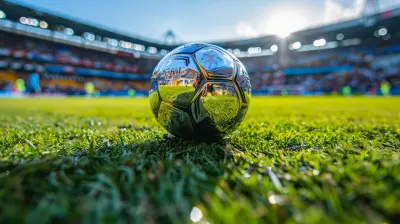18 January 2025
In sports, there’s something magical about early goals. You know what I’m talking about — those moments when a team scores within the first few minutes, lighting up the scoreboard and sending fans into a frenzy. It’s like a jolt of electricity that changes the entire dynamic of the game. But have you ever stopped to think about why early goals are so crucial? Why do they seem to set the tone, not just for the first half, but for the entire match?
Let’s break it down. Whether it’s football, soccer, hockey, or any other sport, early goals have a way of shifting momentum, rattling opponents, and giving teams the confidence they need to control the game. In this deep dive, we’re going to explore why fast starts matter, how they influence the rest of the game, and just how much they can determine the outcome.

Early Goals and Momentum: The Psychological Impact
Momentum is one of those buzzwords you hear in sports all the time. But it's not just a catchy term — it’s a real thing. Scoring early can flip the psychological script of a game in your favor. Think about it: when a team nets a goal in the opening minutes, it’s like they’ve planted a flag, staking their claim on the match. It sends a message to the opposing team that says, “We’re here to play, and we’re already ahead.”Confidence Boost for the Scoring Team
Scoring early gives the attacking team a massive confidence boost. Suddenly, the players feel like they’re in control, dictating the pace of the game. They’re energized, heads are up, and passes start to click. It’s like taking a deep breath after a long sprint — everything becomes a little easier. Instead of chasing the game, the team can now focus on maintaining possession, setting the tempo, and maybe even scoring again.Deflating the Opponent
Now, flip the coin. What happens to the team that concedes an early goal? It’s like getting punched in the gut before you’ve even settled into the fight. Players might become rattled, losing their composure and scrambling to get back into the game. The game plan that was so meticulously crafted starts to fall apart. It’s a psychological blow that can take time to recover from, and in some cases, teams never fully bounce back.Let’s face it, no one likes playing catch-up. It forces you to take risks, push forward more aggressively, and that can leave gaps at the back for the attacking team to exploit. In essence, conceding early can lead to a domino effect of poor decision-making and mistakes.

Setting the Tone: Controlling the Game From the Start
Early goals don’t just give you the upper hand in terms of momentum; they allow you to control the narrative of the game. Once a team takes the lead, they can dictate the tempo and style of play. They don’t have to chase the game, which means they can focus on executing their game plan without taking unnecessary risks.Shifting to a More Defensive Approach
Teams that score early often shift to a more defensive approach, especially if they’re playing away or against a stronger opponent. They focus on maintaining their lead, staying compact, and closing down spaces. This "lockdown" mentality forces the opposition to work even harder to find gaps and create chances. It’s almost like pulling the rug out from under the opponent, giving them fewer opportunities to get back into the game.Forcing the Opposition to Take Risks
On the flip side, the team that’s trailing is now in a position where they have to take more risks. They push forward, commit more bodies to the attack, and often leave themselves vulnerable to counter-attacks. It’s a classic case of “risk versus reward,” and more often than not, teams that are chasing an early deficit find themselves exposed at the back.Imagine you’re playing poker and you’ve just gone all-in on a hand. You’re committed now, and there’s no turning back. That’s exactly what happens when teams fall behind early. They have to push forward, hoping to equalize, but in doing so, they leave themselves wide open to the counter-punch.

The Tactical Advantage of Early Goals
From a tactical standpoint, early goals can completely alter the course of the game. The team that scores early can play with more freedom, making adjustments on the fly, while the opposing side is forced to rethink their entire game plan.Building on Early Success
Once a team has taken the lead, they have the luxury of building on that success. They can stick to their original game plan or adjust based on the flow of the game. If the opposition is pressing high, they can exploit the open spaces behind their defense. If the opponent is sitting deep, they can patiently work the ball around, waiting for the right moment to strike.Subtle Tactical Shifts
Coaches love early goals because they give them more flexibility. They can make subtle tactical adjustments without the pressure of needing to score. For example, if a team scores early in a soccer match, the coach might instruct the full-backs to stay back and focus more on defense rather than overlapping in attack. Or they might tell the wingers to cut inside more often, exploiting mismatches created by a desperate opponent.Conversely, the trailing team is forced to make more drastic changes. They might switch formations, bring on attacking players earlier than they’d like, or push their full-backs higher up the pitch. These changes, while necessary, often leave them exposed to further punishment.

The Statistics Behind Early Goals
Okay, let’s take a step back from the psychology and tactics for a second. What do the numbers say about early goals? Well, the data doesn’t lie — teams that score early are far more likely to win. According to various studies across multiple sports, teams that score within the first 15 minutes have a significantly higher chance of securing victory.In Football (Soccer)
In soccer, for example, teams that score the first goal win around 70% of the time. And when that goal comes within the first 15 minutes, that percentage climbs even higher. This makes sense when you think about it — the earlier you score, the more time you have to control the game and force your opponent to take risks.In Hockey
In hockey, the stats are equally telling. Teams that score the first goal in a game are significantly more likely to win. Early goals in hockey often lead to a more defensive style of play as teams look to protect their lead, making it even harder for the opposing side to get back into the game.In American Football
Even in American football, early touchdowns can dictate the flow of the game. A team that goes up by a couple of touchdowns in the first quarter is suddenly in a position where they can pound the ball on the ground, eat up the clock, and force the opposing team to air it out — which can lead to turnovers and more scoring opportunities.The Emotional Rollercoaster of Early Goals
Let’s not forget the emotional aspect of early goals. For fans, there’s nothing quite like seeing your team take the lead right out of the gate. It’s an adrenaline rush that carries you through the rest of the game. Every pass, every tackle, every shot feels like it means more when your team is in the driver’s seat.For the players, it’s the same. Scoring early puts everyone at ease. Players can relax a bit, knowing they’ve already gotten one on the board. And when the pressure is off, teams tend to play with more freedom and creativity.
The Flip Side: The Anxiety of Conceding Early
Of course, it works both ways. If your team concedes an early goal, the anxiety kicks in. Every missed pass, every blown opportunity feels magnified. Players start to overthink, and that can lead to mistakes. It’s the emotional rollercoaster that makes sports so thrilling — and early goals are often the catalyst.Conclusion: Why Fast Starts Matter
In sports, fast starts are more than just a bonus — they’re often the difference between winning and losing. Early goals set the tone, give teams a psychological edge, and allow them to control the game from the outset. Whether it’s the confidence boost for the scoring team, the tactical flexibility it provides, or the emotional impact on both players and fans, early goals are a game-changer.So, next time you’re watching a game and someone finds the back of the net in the opening minutes, pay attention. That goal might just be the most important moment of the entire match.












Thorne Clark
Great insights! Love the analysis!
March 19, 2025 at 4:32 AM